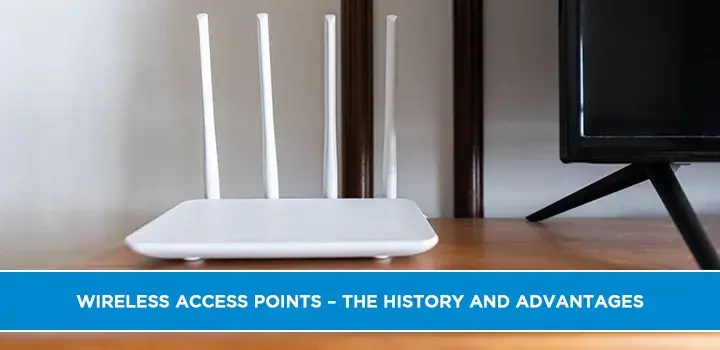Wireless Access Points – The History and Advantages

A wireless access point (WAP) is a device that allows devices to connect to the internet using a wireless signal. They are commonly used in homes and businesses to provide Wi-Fi access. WAPs have been around for many years, and there are several advantages to using them.
What are Wireless Access Points?
A wireless access point is a device that allows devices to connect to a network wirelessly. This can be useful in homes and businesses where there are multiple devices that need internet access, but do not have the ability to be directly connected to a router. WAPs come in a variety of shapes and sizes, but all serve the same purpose: to provide an easy way for devices to get online.
History of Wireless Access Points
- The first wireless access points were released before Wi-Fi. Proxim Corporation, a distant relative of today’s Proxim Wireless company produced these early devices, and they made their appearance in 1994 with the RangeLAN2 product line!
- Wi-Fi access points have been around for a while now, but they really came into their own in the late 1990s.
- The industry gradually began to use the term “AP” instead of WAP, which stands for Wireless Hypertext Transfer Protocol.
The Advantages of Using Wireless Access Points
If you're like most business owners, you're always looking for ways to make your operations more efficient and cost-effective. One way to do this is by using wireless access points (WAPs). WAPs allow employees to connect to the internet and your company's network without having to use cables. This can save time and money since there's no need to install or maintain cable infrastructure.
In addition, WAPs provide a number of other benefits that can help your business run more smoothly.
- Increased mobility - With a WAP, employees can access the internet and your company's network from any location in your office, which gives them greater flexibility and freedom of movement.
- Enhanced security - A WAP provides an extra layer of security for your company's network, making it harder for unauthorized users to gain access.
- Improved uptime - By using a WAP, you can minimize downtime caused by broken or out-of-date cables.
- Reduced IT maintenance costs - Since there's no need to install or maintain cable infrastructure, using a WAP can save you time and money on IT maintenance costs.
- Easy scalability - A WAP allows you to add or remove devices as needed, so it's perfect for businesses that are constantly expanding or contracting their workforce size.
- Increased productivity - Employees who have easy access to the internet and your company's network are often more productive than those who don't.
- Multifunctional devices - Many modern WAPs offer additional features such as media streaming capabilities and printer sharing, which can come in handy if you want to consolidate hardware devices within your office space.
Why Wireless Access Points are a Better Choice for Businesses?
As a business, you want to make sure that you are making the best choices for your company. One of the decisions you may have to make is whether or not to invest in a wireless access point. Many businesses are under the impression that they don’t need one, but there are many reasons why a wireless access point can be a better choice for your business.
Conclusion
An access point is a wireless internet device that provides a portal for devices to connect with an existing local area network. They are used in homes and offices alike, allowing users greater connectivity than they would have otherwise had without it!
Ethernet cables are used to connect a router with an access point, converting the wired signal into a wireless one. Wireless connectivity is typically offered only for this type of device and establishing links between them using Wi-Fi technology will allow you to use your internet connection without having any physical constraints on where they can go or what devices exist around it in the range - meaning there's no limit when downloading things like movies/games, etc.!
Call on (855) 210-8883 to book your appointment with internet experts.